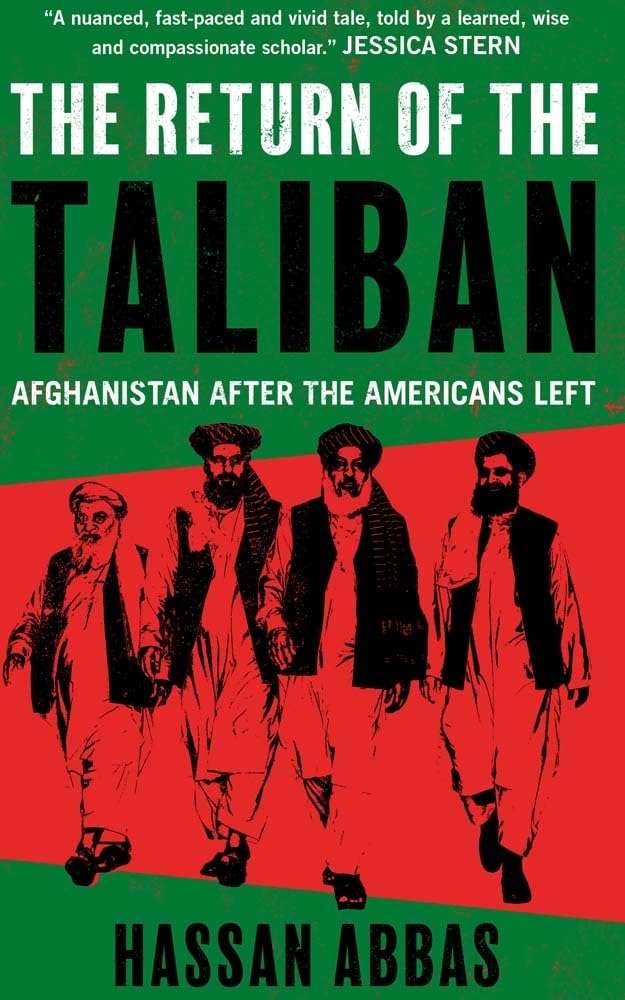Hassan Abbas, The Return of the Taliban: Afghanistan after the Americans Left (New Haven and London: Yale University Press, 2023)
Reviewed by Ajwa Hijazi
Hassan Abbas’s book The Return of the Taliban: Afghanistan after the Americans Left elucidates what followed after the fall of Kabul on 15 August 2021, in Afghanistan. The author guides the reader through an exploration of the Taliban’s challenges and prospects upon assuming power in Afghanistan.
The book is divided into six chapters, each revolving around Afghanistan’s present leadership: the Afghan Taliban. The first chapter highlights the pivotal factors leading to the Taliban’s negotiations with the United States (US), which paved the way for their eventual arrival in Kabul. The second chapter explains the formation of the Taliban’s interim government and their governance dynamics. The third underscores the range of the challenges faced by the Taliban amidst internal divisions in their ranks. The fourth chapter elaborates on their religious roots and its relevancy in the contemporary Muslim world. In the fifth chapter, the author discusses the intricate relationship between the Taliban and its ally, Tehrik-i-Taliban Pakistan (TTP), as well as their hostility towards the Islamic State in Khorasan (ISK). The sixth and final chapter examines the nuanced dynamics of the Taliban’s international relations, highlighting the strategic responses of various nations to their interim government and the pursuit of global recognition.
Abbas opines that the Taliban successfully pursued their core objective during the negotiation process which was the complete withdrawal of US troops from Afghanistan (p. 51). All this while, the Taliban continued to advance in Afghanistan by capturing strategically important areas (pp. 11-12). However, once they attained power, they faced the challenge of transformation from an insurgent group to a functioning government. The author comprehensively outlines their challenges, including internal divisions, policies on women and minorities, financial woes, ISK, etc. He argues that initially, the Taliban appeared to concentrate on improving their global image by setting aside their former stringent policies (p. 85). However, their inherent tendency towards non-inclusivity soon surfaced, notably in their failure to uphold promises of protecting women’s rights. Furthermore, the author probes into the Taliban’s religious foundations, illustrating how their quest to establish a religious state involves merging Afghan nationalism with what he calls, their version of ‘extreme religious nationalism’. (p. 159).
The book also traces the Taliban’s historical closeness with the Tehrik-i-Taliban Pakistan (TTP) and their present leanings towards the group, elucidating the intricate relationship dynamics between Afghanistan and Pakistan. Regarding the Taliban’s international relations, the author contends that their pursuit of global recognition is driven by political, social, and psychological necessities. The Taliban understand that without formal international legitimacy, they struggle to achieve domestic credibility or ensure a seamless governance pathway (p. 211). He concludes that the Taliban must prioritise internal unity. Historically, their cohesion has been rooted in anti-Western sentiments. To collaborate with the very ‘West’ for legitimacy, they need to fundamentally reconsider and internalise their worldview (pp. 237-238). Furthermore, Abbas stresses the importance of engaging with the Taliban, arguing that the world should move beyond the outdated image of Mullah Omar as the face of the Taliban. There’s a need to acknowledge the new reality, where a younger, more moderate generation of the Taliban is likely to significantly influence the policy decisions of the older generation (pp. 150-152).
The author draws on his connections in security and diplomatic circles, including officials from the former Afghan government, using interviews to support his arguments. However, as noted at the end of the third chapter, there are instances where the information from these various sources seems contradictory. Moreover, as Arnold Zeitlin points out, the book largely omits the US’ role in extending the Afghan war over nearly two decades. Zeitlin also observes that the author adopts a rather lenient tone towards Zalmay Khalilzad, the key figure in the US negotiations with the Taliban. On the other hand, he seems to be more abrasive while talking about Pakistan’s role in the Afghanistan situation. For instance, through various nuances, it has been implied that Pakistan ‘aided and abetted’ the insurgency by the Taliban in Afghanistan (p. 244).
This is one of the first comprehensive accounts of the resurgent Taliban government in Afghanistan and aims to differentiate between the ‘old Taliban’ and the ‘new Taliban’. It presents a nuanced and well-researched exploration of the contemporary Taliban’s mindset, demographic composition, leadership, and organisational dynamics. The book offers a critical perspective on the Taliban’s ascendancy to the Presidential Palace in Kabul and their current governance strategies, contrasting significantly with their experience in the 1990s. Whether one agrees with the author’s views on a Taliban-led Afghanistan or not, this work provides valuable insights into the historical and current contexts of the Taliban’s rule.
Ajwa Hijazi is a Research Assistant at the Centre for Aerospace & Security Studies (CASS), Islamabad, Pakistan. She can be reached at cass.thinkers@casstt.com.




